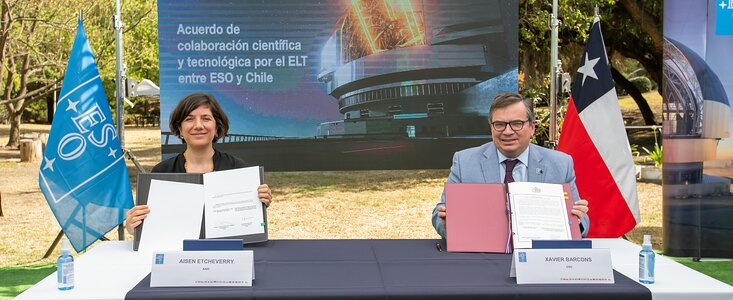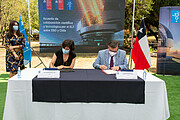Announcement
ESO and Chile sign agreement to foster scientific and technological cooperation on the ELT
15 December 2021
Today, ESO and the Government of Chile, through its National Research and Development Agency (ANID), signed an agreement on scientific and technological cooperation for the construction and operation of ESO’s Extremely Large Telescope (ESO’s ELT), which will be the biggest optical/infrared telescope in the world.
The agreement, signed at ESO offices in Santiago by Xavier Barcons, ESO Director General, and Aisén Etcheverry, National Director of ANID, will fund ELT-related projects in engineering, computing, and other areas proposed by Chilean academic institutes. These projects will allow the training, for at least a decade, of highly specialised engineers, technicians and scientists in Chile.
“With the signature of this agreement with ANID, we are breaking new ground in our long-standing cooperation with Chile. We will now jointly fund projects of interest to both Chile and ESO around the largest optical telescope ever built. Through this programme we will further the engagement between ESO and Chile, with an important focus on the region of Antofagasta,” said Xavier Barcons, ESO Director General.
“This agreement represents a new opportunity to strengthen collaboration between ESO and ANID for the benefit of the scientific community as a whole. The presence of observatories in Chile allows for the development not only of astronomy but also of other disciplines such as engineering, optics among others,” said Aisén Etcheverry, National Director of ANID.
The agreement will also facilitate the training of engineers, technicians and scientists of Chilean institutions at ESO Member States institutes and it will bring experts from these academic centres, participating in the ELT development, to Chilean universities.
Annually ESO will fund up to two positions, each one of 2-years duration, at ESO’s Paranal Observatory in Chile for scientists, engineers and technicians of Chilean institutions for ELT-related projects. To foster the development of advanced human capital locally, an applicant from an institution in the Region of Antofagasta will preferentially fill one of the positions.
“This agreement will allow us to cooperate jointly with Chile in scientific and technological development. Moreover, it will encourage a new generation of specialists who will work in the most complex astronomical systems. Many of them will come from the Region of Antofagasta, giving a very important step in our collaborative work with Chile, but above all, with the regions localities where our infrastructure is installed,” said Luis Chavarría, ESO Representative in Chile during the ceremony.
“Our cooperation with ESO leads us to continue pushing the boundaries of science, and allows us to locate, in Chile, the forthcoming largest optical telescope in the world. The “ELT” is the most recent project that portrays ESO’s participation in Chile, along with ALMA, La Silla and Paranal, the most productive astronomical observatories on the planet, while strengthening the identity of our country, linked to astronomical observation”, said Carolina Valdivia, Undersecretary of the Chilean Ministry of Foreign Affairs.
ESO and ANID will support the agreement with matching funds. The entities will invest up to €900k per year for at least a decade and will work together defining common areas. ANID will organise an annual call of proposals to define the areas of interest.
“This is a great opportunity to continue fostering the local astronomical community and to promote talent development and the generation of knowledge and skills in areas such as engineering and data science. This milestone is possible thanks to our comparative advantages and the great opportunity to have cutting-edge technology in the north of Chile that, in addition to strengthening global and national scientific research, will open new possibilities for innovation and entrepreneurship for the development of the region and our economy," said Andrés Couve, Minister of Science, Technology, Knowledge and Innovation.
ESO’s ELT will be the largest optical/infrared telescope in the world, collecting more light than all of the existing 8–10-metre class telescopes on the planet combined. With its 39-metre main mirror and unique five-mirror design, coupled with state-of-the-art technology to correct for atmospheric distortions, it will provide images 15 times sharper than those from the Hubble Space Telescope.
Set to start observing the skies from Chile’s Atacama Desert in 2027, the telescope will tackle the biggest astronomical challenges of our time and make yet unimaginable discoveries.
Links
Contacts
Francisco Rodríguez
ESO Press Officer Chile
Santiago, Chile
Email: francisco.rodriguez@eso.org
About the Announcement
| Id: | annlang21005-es-cl |
Our use of Cookies
We use cookies that are essential for accessing our websites and using our services. We also use cookies to analyse, measure and improve our websites’ performance, to enable content sharing via social media and to display media content hosted on third-party platforms.
ESO Cookies Policy
The European Organisation for Astronomical Research in the Southern Hemisphere (ESO) is the pre-eminent intergovernmental science and technology organisation in astronomy. It carries out an ambitious programme focused on the design, construction and operation of powerful ground-based observing facilities for astronomy.
This Cookies Policy is intended to provide clarity by outlining the cookies used on the ESO public websites, their functions, the options you have for controlling them, and the ways you can contact us for additional details.
What are cookies?
Cookies are small pieces of data stored on your device by websites you visit. They serve various purposes, such as remembering login credentials and preferences and enhance your browsing experience.
Categories of cookies we use
Essential cookies (always active): These cookies are strictly necessary for the proper functioning of our website. Without these cookies, the website cannot operate correctly, and certain services, such as logging in or accessing secure areas, may not be available; because they are essential for the website’s operation, they cannot be disabled.
Functional Cookies: These cookies enhance your browsing experience by enabling additional features and personalization, such as remembering your preferences and settings. While not strictly necessary for the website to function, they improve usability and convenience; these cookies are only placed if you provide your consent.
Analytics cookies: These cookies collect information about how visitors interact with our website, such as which pages are visited most often and how users navigate the site. This data helps us improve website performance, optimize content, and enhance the user experience; these cookies are only placed if you provide your consent. We use the following analytics cookies.
Matomo Cookies:
This website uses Matomo (formerly Piwik), an open source software which enables the statistical analysis of website visits. Matomo uses cookies (text files) which are saved on your computer and which allow us to analyze how you use our website. The website user information generated by the cookies will only be saved on the servers of our IT Department. We use this information to analyze www.eso.org visits and to prepare reports on website activities. These data will not be disclosed to third parties.
On behalf of ESO, Matomo will use this information for the purpose of evaluating your use of the website, compiling reports on website activity and providing other services relating to website activity and internet usage.
Matomo cookies settings:
Additional Third-party cookies on ESO websites: some of our pages display content from external providers, e.g. YouTube.
Such third-party services are outside of ESO control and may, at any time, change their terms of service, use of cookies, etc.
YouTube: Some videos on the ESO website are embedded from ESO’s official YouTube channel. We have enabled YouTube’s privacy-enhanced mode, meaning that no cookies are set unless the user actively clicks on the video to play it. Additionally, in this mode, YouTube does not store any personally identifiable cookie data for embedded video playbacks. For more details, please refer to YouTube’s embedding videos information page.
Cookies can also be classified based on the following elements.
Regarding the domain, there are:
- First-party cookies, set by the website you are currently visiting. They are stored by the same domain that you are browsing and are used to enhance your experience on that site;
- Third-party cookies, set by a domain other than the one you are currently visiting.
As for their duration, cookies can be:
- Browser-session cookies, which are deleted when the user closes the browser;
- Stored cookies, which stay on the user's device for a predetermined period of time.
How to manage cookies
Cookie settings: You can modify your cookie choices for the ESO webpages at any time by clicking on the link Cookie settings at the bottom of any page.
In your browser: If you wish to delete cookies or instruct your browser to delete or block cookies by default, please visit the help pages of your browser:
Please be aware that if you delete or decline cookies, certain functionalities of our website may be not be available and your browsing experience may be affected.
You can set most browsers to prevent any cookies being placed on your device, but you may then have to manually adjust some preferences every time you visit a site/page. And some services and functionalities may not work properly at all (e.g. profile logging-in, shop check out).
Updates to the ESO Cookies Policy
The ESO Cookies Policy may be subject to future updates, which will be made available on this page.
Additional information
For any queries related to cookies, please contact: pdprATesoDOTorg.
As ESO public webpages are managed by our Department of Communication, your questions will be dealt with the support of the said Department.




